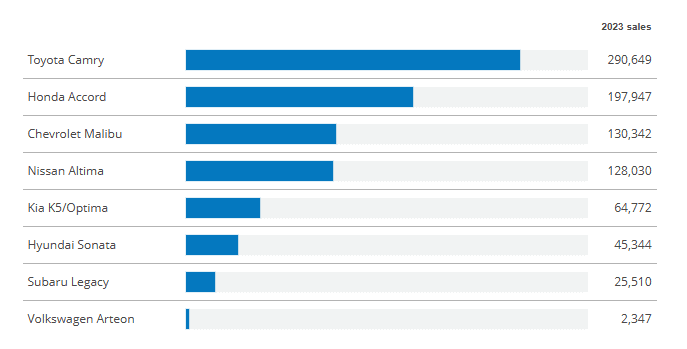In recent years, the midsize sedan market has seen big changes. Once a popular choice for many drivers, midsize sedans are now losing ground. With several carmakers discontinuing their sedan models, the landscape is changing fast. Yet, amid this decline, the Toyota Camry remains strong, leading in sales. This article looks into why midsize sedans are losing appeal and how the Camry stays on top.
Why Are Midsize Sedans Fading Away? Insights and Analysis (PDF)
The Rise and Fall of Midsize Sedans
The Golden Era
Midsize sedans were once the favorites in the car world. They offered a great mix of comfort, performance, and practicality, making them a top choice for families and commuters. In 2014, over 2.4 million midsize sedans were sold in the U.S., making up almost 15% of the total light-vehicle market.
The Shift in Consumer Preferences
However, in the past decade, people’s preferences have shifted a lot. SUVs and crossovers, with their higher seating and more cargo space, have become the new favorites. These vehicles offer a sense of safety and flexibility that appeals to many buyers. As a result, sedan sales have dropped.
Market Dynamics and Automaker Decisions
Automakers Pulling Out
Many carmakers have responded to this shift by stopping production of midsize sedans. General Motors recently announced it will end production of the Chevrolet Malibu to focus on electric cars. Subaru is also discontinuing its Legacy sedan after the 2025 model year. Other brands like Ford, Mazda, and Volkswagen have also left the segment, leaving just a few models behind.
The Toyota Camry’s Resilience
Despite these trends, the Toyota Camry remains a strong presence in the market. Toyota executives have stressed their commitment to sedans, seeing value in a segment that others are leaving. In 2023, the Camry accounted for almost one-third of all midsize sedan sales in the U.S., showing its lasting appeal.
Factors Behind the Decline
Changing Lifestyles
One big reason for the decline of midsize sedans is changing lifestyles. Modern families often prefer the flexibility of SUVs, which can handle outdoor activities, sports gear, and more. The ability to easily carry items and passengers without losing comfort is a major draw.
Economic Considerations
Economic factors also play a role. With changing fuel prices and better fuel efficiency in larger vehicles, the economic advantage of sedans has lessened. Plus, the rise of electric and hybrid vehicles has shifted focus away from traditional sedans.
Technological Advancements
New technologies in SUVs and crossovers have made these vehicles more attractive. Features like advanced driver-assistance systems, better safety options, and improved infotainment systems have made larger vehicles more appealing than ever.
The Future of Midsize Sedans
A Niche Market
While the midsize sedan market is shrinking, it’s not going away completely. There will always be some people who prefer the driving experience and look of a sedan. Automakers like Toyota, with its Camry, will likely keep serving this smaller market, even with fewer competitors.
Transition to Electrification
The move to electric vehicles (EVs) presents both challenges and opportunities for the midsize sedan segment. Sedans can play a key role in the shift towards more eco-friendly transportation, especially as automakers develop electric and hybrid versions of their popular models.
2023 Midsize Sedan Sales
| Model | Sales |
|---|---|
| Toyota Camry | 290,649 |
| Honda Accord | 197,947 |
| Chevrolet Malibu | 130,342 |
| Nissan Altima | 128,030 |
| Kia K5/Optima | 64,772 |
| Hyundai Sonata | 45,344 |
| Subaru Legacy | 25,510 |
| Volkswagen Arteon | 2,347 |

Conclusion
The decline of midsize sedans is due to changing consumer tastes, economic factors, and new technologies. While many carmakers have left the segment, the Toyota Camry remains a strong leader, adapting to changes and continuing to meet the needs of its loyal customers. As the car market evolves, will midsize sedans find a new place or fade away completely?
What do you think about the future of midsize sedans?


